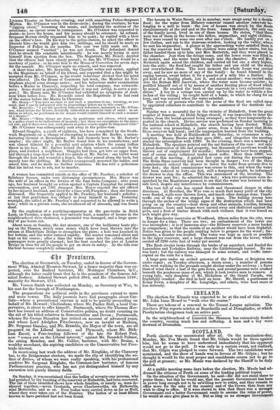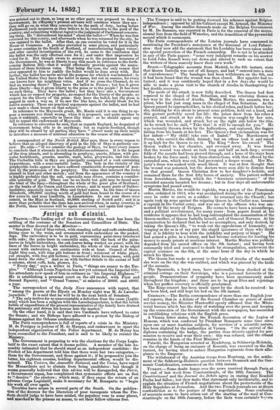SCOTLAND.
Perth election was uncontested after all. On the nomination-day, Monday, Mr. Fox Maule found that Mr. Gilpin would be there against him, but he seems to have understood immediately that his opponent would not go to the poll. It was only in a certain event, not realized, that Mr. Gilpin was pledged to come forward. The two candidates were nominated, and the show of hands was in favour of Mr. Gilpin ; but he thought it would be the most proper and considerate course not to go to the poll at present; so Mr. Maule was declared by the Sheriff to be duly elected.
At a public meeting some days before the election, Mr. Manic had ad- dressed the citizens of Perth on some of the leading political topics. On the situation of the Government, he said—He did not stand there to- praise them ; but this he would say, that the present Government has been in power long enough not to be unwilling now to retire, and they remain in office more for the sake of the country and of the Crown than from any wish to cling to office. If it were shown to him that there was a stronger Government and a better Government ready to assume the reins of power, he would at once give place to it. But so long as no stronger Government
was pointed out to them, so long as no other party was prepared to form a Government, he rIlajesty's present advisers will continue where they are : they will go on in what they conceive to be the path of duty, laying before Parliament such measures as they believe to be conducive to the good of the country, and submitting without regret to the judgment of Parliament concern- ing them. He " disburdened his mind " about the ballot—" When he was first returned for this county, and afterwards when he was returned for the city, he was opposed to the ballot. After that, on one occasion he voted for it in the House of Commons. A practice prevailed in some places, and particularly in some counties in the South of Scotland, of manufacturing faggot voters ; and after careful investigation of the evil, he came to the conclusion that the ballot was the only effectual cure for it ; and under that impression he voted for it. But though sworn to secrecy as to the proposed measures of the Government, he was at liberty to say this much in reference to the forth- coming Reform Bill—that it would effectually provide against the manu- facture of those fictitious votes. That being the case, the only reason that ever appeared to him to justify the ballot would be done away. with. But farther, the ballot has never served the purpose for which it was intended : in the United States they have the ballot in name, but not in essence, for every one knows how his neighbour votes. And if we cross the Channel, do we find no warning there ? They have the ballot in France ; but has it given them liberty—has it given liberty to the press or to the people ? It has done no such thing. They have the ballot ; but they have also a Government which has no respect for property, no respect for the liberty of the people, no respect for the liberty of the press : they have the ballot, but the press is gagged in such a way as, if ho saw the like here, he should blush for his native country. These are practical arguments against the ballot, and he had now made a clean breast on that subject"
In reference to the Maynooth grant, Mr. Mauls said it is one thing to op- pose a measure you think wrong, when it is proposed, and quite another to undo it suddenly, especially in times litre these : so he should oppose any bill to repeal the endowment of Maynooth. In reference to education he said, that as regards England, he despaired of Government being able to do anything; but as regards Scotland, though
they will be abused by all parties, they have " almost made up their minds introduce ntroduce a measure of national education in the course of this session."
A correspondent of the North British Mail says, there is every reason to believe that an alleged discovery of gold in the Isle of Skye is perfectly cor- rect. He adds—" If we consider the geology of Skye, we have every reason to conclude that it abounds in rich metalliferous substrinces. It is the largest of the trap islands, and is abounding in porphyry, quartz, felspar, with gra- nular hornblende, granite, marble, marl, mica, grevwacke, and talc slate. The Cuchullin hills in Skye are principally composer) of a rock containing hypersthene, with a semi-metallic lustre. The beds in the vicinity of the porphyritic rocks appear to have suffered considerable derangement of posi- tion by the protrusion of the porphyry. The veins that intersect the rocks abound in lead and other metals ; and from the appearance of the country it is highly probable that the soil, especially near rivers, contains a consider- able quantity of gold. There can lie no doubt but gold may be found near the tract of the Spey—throughout the whole of the great glen of Scotland ; on the banks of the Conon and Carron rivers • and in many parts of Suther- landshire, especially near the Shin and Oykefwaters. In the time of Queen Elizabeth, 100,000/. sterling worth of gold had been found in the course of a few years in and near Leadhills, in Lanarkshire. In one year there were coined, in the Mint in Scotland, 48,0001. sterling of Scotch gold ; and it is more than probable that the time has now arrived when in many counties in' the North, these treasures will be again discovered, and again laid open."



























 Previous page
Previous page